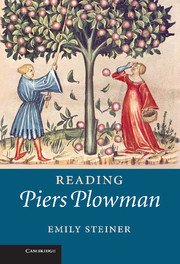5 - Practice
(B.13–15)
Published online by Cambridge University Press: 05 May 2013
Summary
“Thanne passe we over til Piers come and preve this in dede”
(B.13.133).Introduction
In the third vision of Piers Plowman (B.8–12), the dreamer debates salvation theology with personifications of learning: Thought, Wit, Study, Clergie, Scripture, Reason, and Imaginatif. With each interlocutor, the dreamer tries to gauge the likelihood of his own salvation, and whether the plan of salvation is inclusive or exclusive, fair or unfair, proof of God’s mercy or his justice. By connecting emotionally and intellectually with “old livers” – antique rulers, philosophers, and poets – the dreamer gains a purchase on his future while reaching back in time to those whose salvation is uncertain at best.
The dreamer’s opening gambit in these passūs is to ask his interlocutors to define Dowel, Dobet, and Dobest (what it means to do well, better, and best), a line of questioning that continues into B.13. Each character he interviews has at least one good answer to the question, but Patience’s answer in B.13 is the most succinct: “Disce and Dowel; Doce and Dobet; / Dilige, and Dobest” [“Learn” and Dowel; “teach” and Dobet; / “love (your enemies)” and Dobest] (13.138–39, from Luke 6:27). The Dowel triad promises a foolproof way of parsing the good life. At the same time it provides a literary form versatile enough to structure any expression, from the most compressed maxim, to a complete biblical episode, to an entire section of the poem. In B.19/C.21, for instance, Conscience uses the triad to organize Christ’s life: Dowel represents the Incarnation; Dobet, Christ’s teaching and miracles; and Dobest, Christ’s death and the Atonement. Scribes of the B- and C-texts, perhaps inspired by B.19, used the Dowels as external markers in addition to, and often overlapping with, passus rubrics. Thus, in many C-text manuscripts, passūs 10–16 are labeled the “Vita de Dowel”; passūs 17–19 the “Vita de Dobet”; and passūs 20–22 the “Vita de Dobest.”
- Type
- Chapter
- Information
- Reading Piers Plowman , pp. 140 - 171Publisher: Cambridge University PressPrint publication year: 2013



